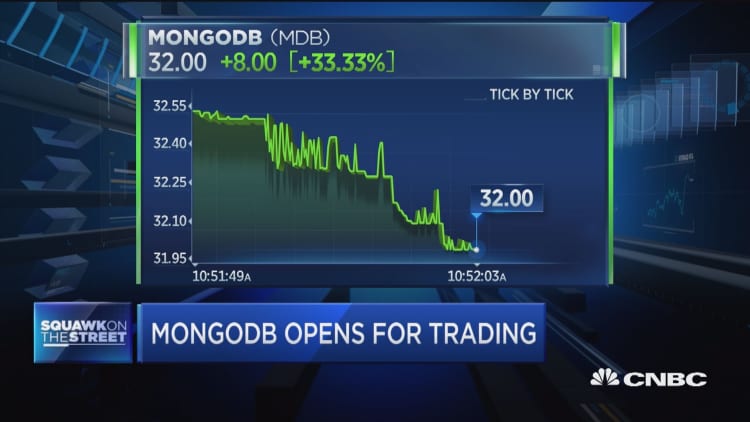Here's a round-up of the most important deals in venture capital from the past two weeks.
Exits
Auto parts maker Delphi announced that it will acquire self-driving software start-up NuTonomy in a deal valued at $450 million. Delphi, a top-tier supplier, aims to speed up the development of autonomous vehicles. NuTonomy, based in Boston, will bring new partnerships over to Delphi. The start-up had been working with ride-hailing businesses including Lyft and Grab, and conducting self-driving taxi tests in Singapore with the latter.

MongoDB, the database services provider, made its Nasdaq debut, pricing its IPO at $24 per share, above the expected range. The company was backed early on by Union Square Ventures, Sequoia Capital and New Enterprise Associates.
Assa Abloy agreed to acquire smart-lock makers August Home for an undisclosed price. The hardware start-up had raised $75 million in venture funding from Bessemer Ventures, Maveron and SoftTech VC, and the venture arms of Comcast and Qualcomm, among others. Maveron's David Wu told CNBC, "[August Home co-founder Jason Johnson] has been predicting in-home delivery for years."
Disclosure: Comcast Ventures, the venture arm of CNBC parent Comcast, invested in August Home.
WeWork acquired education start-up Flatiron for an undisclosed price. The deal came after Flatiron, a for-profit programming trade school, faced fines and regulatory scrutiny for operating without a license and misleading advertising, EdSurge reported.
Facebook acquired a mobile start-up called tbh for an undisclosed price. The tbh app lets users send anonymous polls and surveys to their network and was popular with teens.
Start-ups

The growth investing arm of Alphabet, CapitalG, is leading a $1 billion investment in ride-hailing platform Lyft, giving the company a post-money valuation of $11 billion. As CNBC previously reported, Alphabet's self-driving car unit, Waymo, has partnered with Lyft on a self-driving car project. Another Alphabet-affiliated venture firm, GV (formerly Google Ventures) is a major investor in Lyft's primary competition, Uber. CapitalG founding partner David Lawee will join Lyft's board of directors.
Goldman Sachs, Sequoia Capital and Matrix Partners are investing $60 million into Klook, a tours and activities booking site based in Hong Kong. As Skift reports, Klook competes with GetYourGuide, Viator and Peek. But it appeals to travelers in the Asia-Pacific region with QR code e-vouchers for ticketing, an extensive inventory of things to do at big theme parks, and a WeChat integration that has its listings showing up in travel search results there.
Health start-up Gemini Therapeutics announced that it raised $42.5 million in a series A round of funding to find a cure for age-related macular degeneration, the leading cause of irreversible blindness in the U.S. Investors included Atlas Venture, Lightstone Ventures and OrbiMed.
Madison Reed, a hair products brand which is now operating its own "color bar" salons, raised $25 million in a new round of funding led by Comcast Ventures, TechCrunch reported. Earlier backers also joined the round, including Norwest Venture Partners, True Ventures and Calibrate.
Disclosure: Comcast Ventures is the venture arm of CNBC parent Comcast.
GV (Google's venture arm) and Lux Capital invested $12 million in Veo Robotics, a start-up making "robot awareness systems." Veo uses cameras and deep learning software to make big, industrial robots keenly aware of their surroundings so they can operate safely alongside humans, rather than staying constrained in a caged area on a factory floor.
Veo investor Bilal Zuberi of Lux Capital told CNBC, "With the kind of perception that Veo is bringing to industrial robotics, in 10 years, the Kiva systems that have given Amazon an edge will look ancient. Robots will know when and where people are, can help analyze everything going on in a factory or warehouse, and if there is an unsafe situation developing, they will automatically correct it."
Samsung Ventures is pouring $5 million into Los Angeles-based media and entertainment start-up Pluto TV. Tapping into the "cord-cutter" trend, Pluto TV offers a free online television viewing service. As Variety reported, the new investment brings Pluto TV's total funding to $51.8 million.
Funds and firms
Owl Ventures closed its second fund at $185 million to keep investing in education-related technologies. The firm has previously backed Quizlet, a popular study app, Newsela, a platform that adapts news articles to different students' reading levels, and Raise.me, which helps students earn scholarships from colleges based on specific academic and extracurricular achievements throughout high school.
A biotech investor, Illumina Ventures, closed its debut fund at $230 million. The firm announced that it will back companies involved in: "genomics and precision medicine ... life science research, clinical diagnostics, novel therapeutic platforms, and other technologies impacting human health."


